Esports is expected to breach the US$ 1 billion revenue mark in 2020 and enjoy an audience of close to 500 million, according to Newzoo. Meanwhile, industry experts forecast esports (short for electronic sports or organised video game competition) to surpass the viewership of traditional sports such as the National Football League.
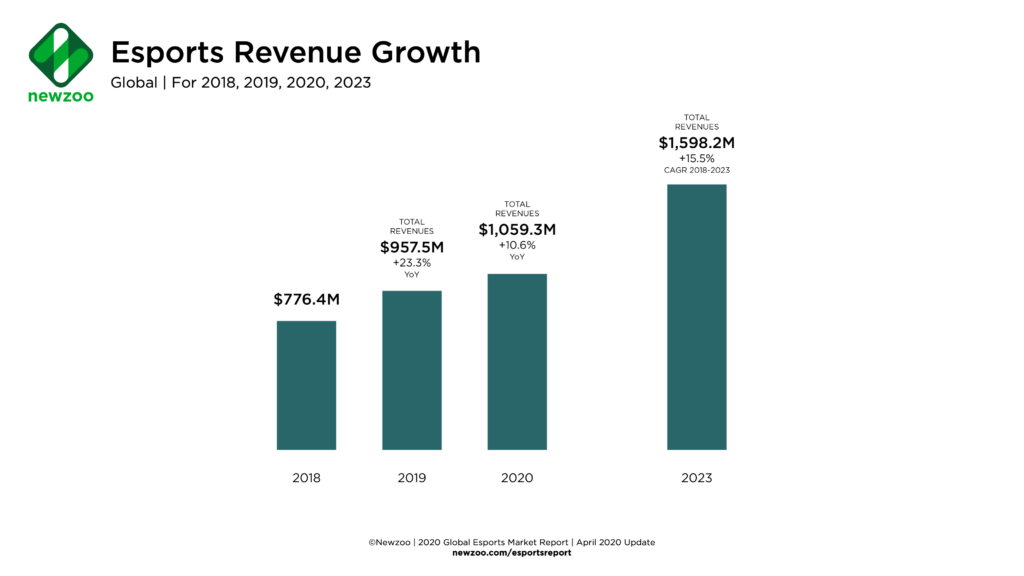 Source: Newzoo, 2020 Global Esports Market Report
Source: Newzoo, 2020 Global Esports Market Report
When you look at esports today, the industry is synonymous with hardcore games in that it revolves around mostly male hardcore players, who engage in immersive games through organized competitive settings. Prize money leaderboards are likewise dominated by players, such as Johan Sundstein (‘N0Tail) and Jesse Vainikka (‘JerAx’), while live-streaming audiences rally around hardcore games. These tournaments include League of Legends, CS:GO, Dota, Overwatch, and Hearthstone.
Casual games, which are characterized as games that are easy to grasp and play on the go, are glossed over in the esports landscape despite a strong global following. These types of games include puzzles, word, trivia, arcade, sports, and card. Recent academic research and industry studies scarcely mention casual games as a potential esport category as they are often just considered as a mere pastime for the masses.
Data suggests that it is only a matter of time before casual games elevate to the esports level and players of these genres take their seats in the pantheon of stars of esports. Casual gamers outnumber hardcore gamers greatly with more than half of gamers categorized as casual gamers, according to Limelight Networks. In 2019, casual games accounted for 82% of game downloads and 44% of game time spent, according to App Annie. Respectively, Arcade and puzzles accounted for 47% and 21% of game downloads.
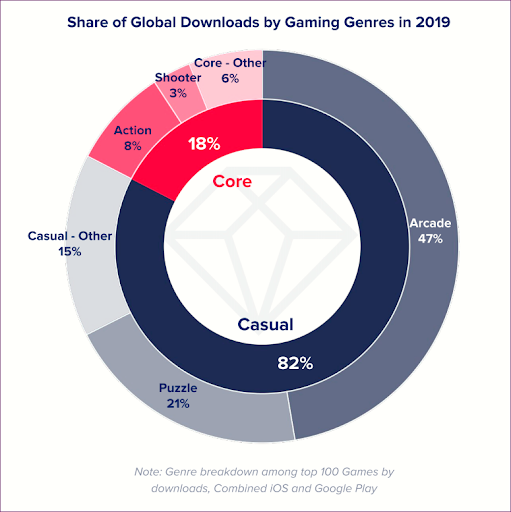
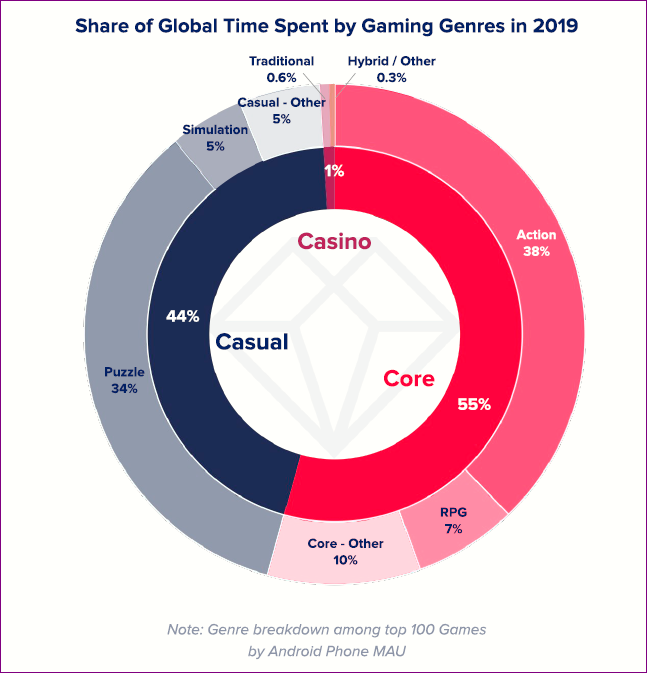
Source: App Annie (Report: State of Mobile 2020)
The history of esports traces its roots back to casual games, specifically to the arcade days of the 1980s. The first recognised major esport event was an arcade game called Space Invaders. Atari hosted Atari 2600 Space Invaders Championship in New York in 1980 with an attendance of more than 10,000 participants and was won by Rebecca Heineman. Furthermore. T.L. Taylor, an MIT professor who specialises in esports, commented in her book Raising the Stakes: E-Sports and the Professionalization of Computer Gaming, that the 1982 TV show Starcade, which featured competitive arcade play, provided “a great glimpse into one of the several attempts in the 1980s to integrate a new form of leisure, video gaming, into an existing one, television.” Meanwhile, the history of video games could not be completed without mentioning the controversial Billy Mitchell, who achieved the first perfect score on PAC-Man with 3,333,360 points, according to the Guinness World Records.

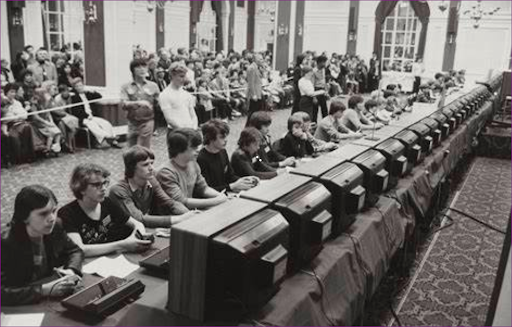
Source: Reddit, Ataricompendium.com
Casual games have become highly accessible on mobile devices. The mobile phone is now the go-to device for players to access such games. In 2019, there were 2.5 billion mobile gamers worldwide, compared with 1 billion PC gamers and 500 million console gamers, according to Niko. Accessibility of games on mobile has allowed casual gamers to play and train anywhere, anytime.
The definition of a “gamer” is also no longer cut and dried. Many so-called “casual gamers” do not consider themselves gamers, despite spending an almost similar number of hours as hardcore gamers in improving their gameplay. Almost two-thirds of casual gamers do not consider themselves gamers. This statistic includes women and those who play mobile games an average of four times a week, according to a survey made by Applovin. Gamers are traditionally viewed as being tethered to their PCs or console for hours, unlike mobile casual gamers who play games during a subway commute, while getting their hair done in the salon, or between meetings. Look over the shoulders of some people on your next bus ride, and you will see casual gamers jabbing at their mobile screens and letting out grunts of victory and despair over a game. Furthermore, the word “gamer” is often associated with a male player, hence why female gamers tend to not address themselves with such a title.
The discussion of casual games is incomplete without highlighting the prominence of women players in the category because while men seemingly tend to dominate the craft, female players are also part of that broad audience. Based on a 2017 survey collected in 13 countries by Newzoo, women accounted for 46% of all gamers and 48% of mobile gamers. In Asia alone, Niko estimated that female gamers accounted for 38% of all gamers as of late-2019, which is a significant increase from less than one third in 2016.
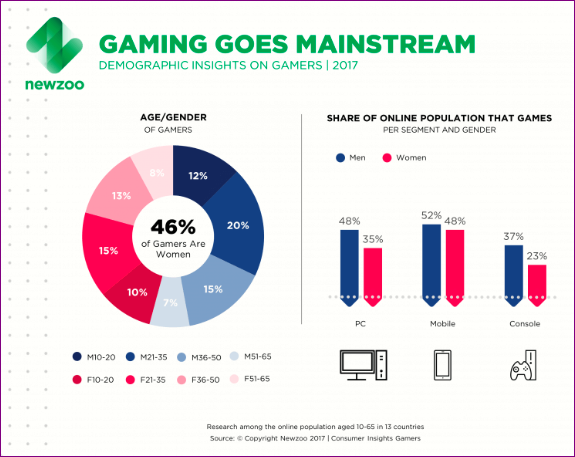
Source: Newzoo
Niko reported that female gamers who play for six hours a week account for 60% of female gamers. In that percentage, women regularly play Match-3 games like Candy Crush, a game that has received 2.7 billion downloads since its launch.
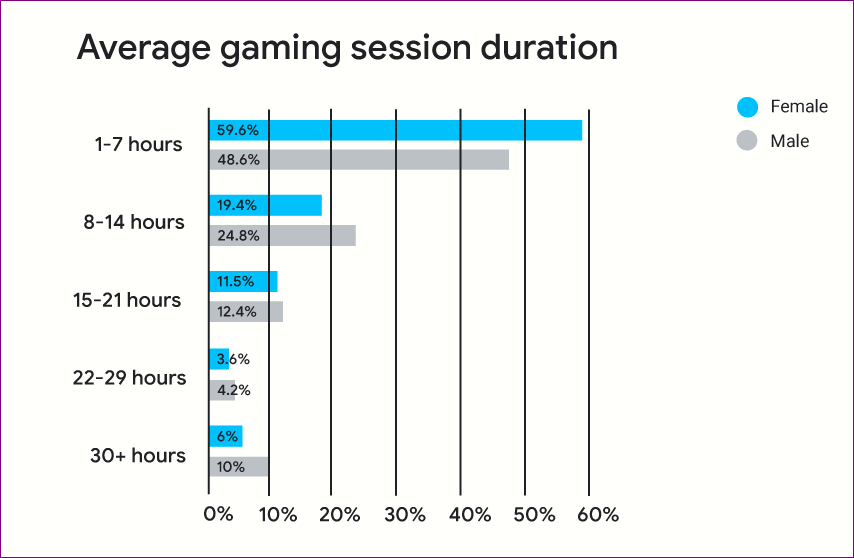
Source: Niko
Given the data presented, esports platforms are likely to emerge that will cater to a new generation of competitive casual gamers. Currently, these gamers do not have a platform where they can be recognised as athletes and go pro. Just like hardcore games, mastery and success in skill-based casual games require extensive training, strategy, attention, agility, and dexterity. Casual games require good hand-eye coordination and strategy. Skepticism towards casual games as an esport is understandable and reminiscent of the cold reception of traditional sports athletes towards esport as a sport. While esports debuted in the 2019 Southeast Asian Games, the International Olympic Committee has yet to adopt esport as an Olympic sport.
“The story of esports development is a complex one spanning multiple decades. It can be helpful to think about its trajectory as waves in which particular aspects come into focus and rise in salience.” – T.L. Taylor (Watch Me Play: Twitch and the Rise of Game Live Streaming)
Skibre is building an esports platform to address this gap and allow casual gamers to be recognized as athletes and go pro. Skibre is a social and mobile-based competitive multiplayer mobile esports platform dedicated to hosting casual mobile gaming tournaments based on skills for players across genres, including arcade, puzzle, sports, action, quiz, and AR/VR. It partners with local and international game developers through enabling social competition in their games and hosting them on the Skibre super app. Since Skibre’s launch in May 2020, it has hosted more than 100,000 tournaments on its platform.
Skibre envisions that a time will come when champions of casual games will count among the elites of esports and when these games will be live-streamed and played in leagues with the elements of competition, performance, and entertainment. While may sound facetious, the thought of hosting World Championships for Scoop Basketball, Block Puzzle, and Fruit Chopper in large arenas, it is worth remembering that it was not long ago when top hardcore esports players weren’t even considered athletes. It is a matter of time when various casual games will achieve the status of esport as they gain dedicated followers, athletes, sponsors, coaches, and viewership.
The next time you hop on the subway, remember that the person sitting next to you playing casual games and jabbing at her mobile screen might just be the next esports superstar.
To read similar stories, please hop on to Oasis, the brainchild of KrASIA.
Michael Oyson, is CEO and Co-Founder of Skibre, a mobile-based esports platform based in Singapore. He holds an Executive MBA from Northwestern University’s Kellogg School of Management and The Hong Kong University of Science and Technology. He is a former national athlete who qualified to participate in the 2010 Asian Games. Skibre is an Antler portfolio company. Antler is the world’s largest technology company builder and a global early-stage venture capital firm. For more information, visit www.skibre.com.
Disclaimer: This article was written by a community contributor. All content is written by and reflects the personal perspective of the interviewee herself. If you’d like to contribute, you can apply here.
